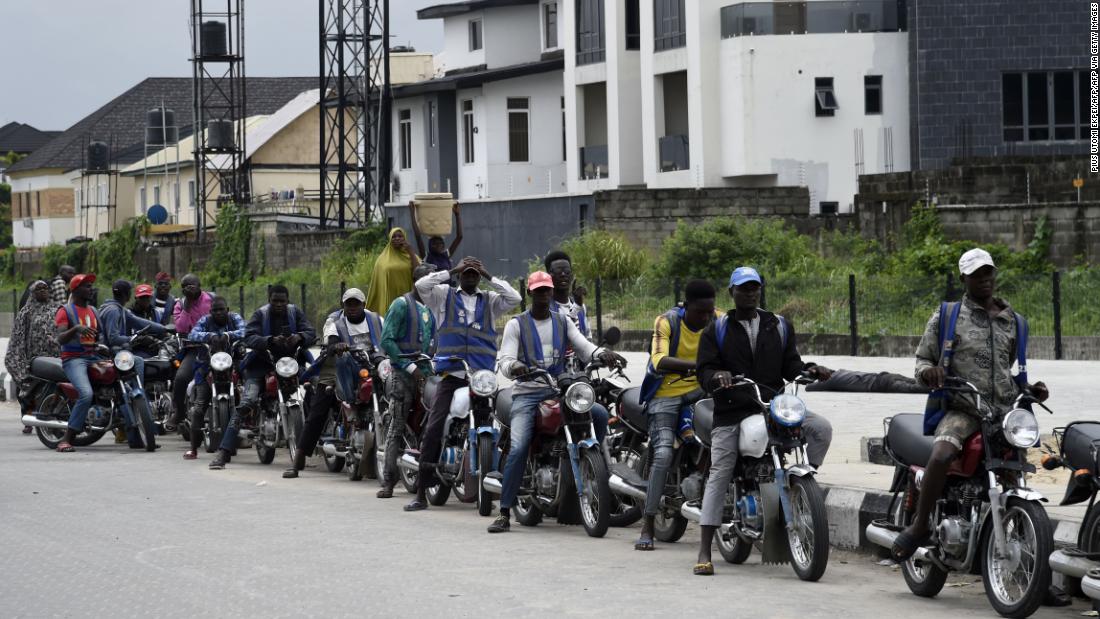Eyewitness reports said police fired teargas into the air to disperse protesters.
Lagos state police spokesman Bala Elkana confirmed that police fired teargas as drivers protested in the Ijora, Apapa district of the city. He said the protest was violent and the drivers burned tires and attacked people passing by.
“Police was deployed there and they were able to provide calm. There has been no record of anyone dying,” Elkana told CNN.
Non-commercial motorbikes are also banned in those areas. Only company delivery bikes are allowed.
Motorcycle-hailing startups have become attractive alternatives because bikes can easily cut through gridlock, unlike other vehicles.
Lagos state’s commissioner for information and strategy, Gbenga Omotosho, said the ban was needed because of deaths, accidents and disorderliness caused by motorbike taxis, popularly known as “Okada,” and commercial tricycles, known as “Keke Napep.”
“They (motorcycle-hailing startups) have been discovered to be part of the problem they set out to solve. Their riders are involved in accidents and breaking road rules,” Omotosho told CNN.
However, Lagosians have reacted angrily, saying that the governor should have implemented the buses before enforcing the ban, which has caused commuters to walk long distance to destinations.
Akinbobola Akinola, who has been a Lagos resident for more than 20 years, says the government should have rolled out alternative smaller buses before enforcing the ban.
“I paid five times my usual fare to work this morning because I had to use an Uber. …I think they should have placed the buses on the roads before issuing a press release about the ban,” he told CNN.
Road accidents and security
Motorcycle-hailing operators like Max.ng say that their businesses are safe and accident-free.
Since being established in 2015, Max.ng has completed more than 2 million trips without any deaths, says Adetayo Bamiduro, the company’s co-founder.
Operators have channels on their apps and websites that allow passengers to report issues of theft, accidents and disorderliness by drivers in real-time, he said.
“We also have guarantors that stand on behalf of our drivers so that if anything happens we have a third party that has agreed to cover any issue that will result from the driver’s negligence. We have an airtight security system,” Bamiduro said.
The ban will affect the individual jobs of many Lagos residents, including motorcycle and tricycle riders. Bamiduro says motorcycle drivers who are a part of their platforms will no longer be able to work in major areas, significantly limiting their incomes.
With operations in three other Nigerian cities, Max.ng has 2,200 drivers employed on their platform and has provided 73,000 indirect jobs, Bamiduro said.
Iyinoluwa Aboyeji, an entrepreneur and co-founder of technology company Andela, says the ban on motorcycle-hailing companies will take away jobs provided by the tech industry.
“Over the past year, thousands of jobs have been provided in the bike industry. It is easy to train them (drivers) in logistics, it is easy to train them to pick riders as well. Why is the government throwing away these jobs?” he told CNN.
Job loss and investments
In 2019, Nigerian startups attracted one of the highest numbers of investments in the technology space in Africa, according to local media. Motorcycle-hailing startups contributed.
With the ban, there is a possibility of dealing with losses for investors. Bamiduro says before the ban the Lagos state government had actively encouraged operators to invest millions of dollars in technology, manpower, and asset acquisition.
“We invested significantly in creating a cordial relationship with the government and we operate within the confines of the law. We have had courtesy calls to government officials and have been in touch with the ministry of transportation for months,” he said.
But the government says regardless of what the policy says and its past relationship with motorcycle-hailing startups, the ban is in the best interest of Lagos residents.
“It is not a sentimental matter, the safety of Lagosians is far greater than any personal relationship we have had with them (motorcycle-hailing startups) in the past,” Omotosho said.
Protests in Lagos
According to him, the startups by design are more accountable in terms of accidents and safety in comparison to regular motorcycles in the state.
“I think that if the government wants to solve the issue of security they should use the bike hailing apps. It is easy to track passenger security using them,” said.
By making use of platforms like Max.ng and Gokada, which track and report thefts, accidents, and disorderliness, the government has a better option of curbing lawlessness, he says.
Motorcycle-hailing startups organized a protest in the state capital January 31 asking that the government to regulate them instead of imposing an outright ban.
Through regulation, the government would have some control over their activities and could enforce security.
But Omotosho says the government’s focus is now rolling out alternative forms of transport for Lagos residents to ease the commuting process.
“In just a matter of days we will roll out the alternatives,” he said.
Source: CNN Africa




